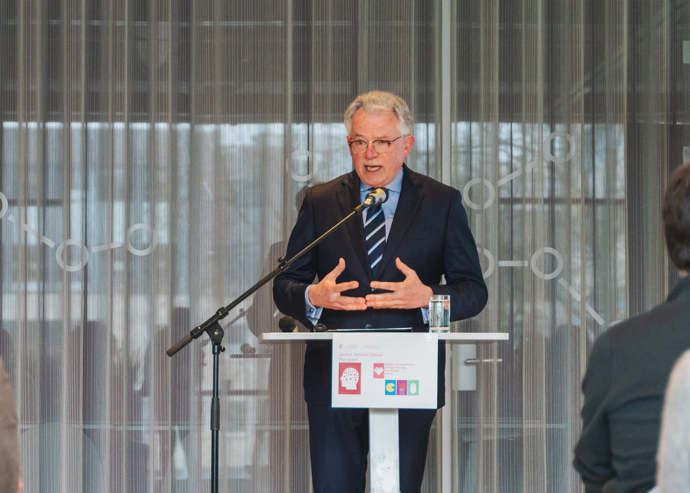'Searching for a modern Wonder of the World'

During the Pitch Event hosted by the Jantina Tammes School of Digital Society, Technology and AI, 12 scientists of the University of Groningen explained how their research can contribute to Nij Begun's economic agenda. Prior to the pitches, Koen Schuiling, mayor of the municipality of Groningen, gave a speech to the audience. 'I trust that you want to participate in Nij Begun because you believe in it.'
Nij Begun ('New Beginnings') is the government's response to the parliamentary inquiry into gas extraction. The package of 50 concrete measures should give Groningen perspective for the next 30 years. Nij Begun was the focus of the meeting at the House of Connections, organised by the Jantina Tammes School of Digital Society, Technology and AI. During the pitched event, several researchers told how research from the University of Groningen can contribute to the economic agenda of Nij Begun.
Role of the university
Prior to the 12 pitches, Quin Genee, Head of Societal & Governmental Engagement, discussed the possible role of the University of Groningen with Arts Dean Thony Visser and Rector Jacquelien Scherpen. The themes of Nij Begun's economic agenda include health, energy and rural areas. Digitisation, the theme of the Jantina Tammes School, is not directly listed, Genee noted.
Visser responded that digitisation is intertwined with all the themes of the economic agenda. 'Without digitisation, we cannot develop these three themes,' the dean stated. Rector Scherpen agreed, proceeding to explain the university's commitment to the Groningen region. 'We are an international university with local impact.' She also stressed the importance of innovation through scientific research and the perspective for young people in the North.
Collaboration
After the brief introduction by Visser and Scherpen, mayor Koen Schuiling took the floor. He told the audience about the establishment of Nij Begun, which is meant to provide perspective for Groningen. According to him, there were no harsh negotiations. 'There was no one who said: you got that, and therefore I should get this. Instead, we managed to shape the future of Groningen together.' He also addressed the researchers present. 'I trust that you want to participate in Nij Begun because you believe in it.'
According to Schuiling, the economic agenda revolves around three major transformations: the energy transition, healthy ageing and providing new perspectives for farmers. These developments are not limited to one field, the mayor stressed, an observation that fits well with the purpose of the Schools for Science and Society. ‘This is a bit of a cliché: but everything is connected to everything. With Nij Begun, there will be money, time and space to connect everything to everything too.'
Digital infrastructure
Groningen was (economically) successful in several areas in the past, leading to great wealth, mayor Schuiling said. He pointed, for example, to the grain and potato industry, raw materials such as gas and turf, but also to the more recently developed ecosystem for healthy ageing. 'We were successful in these areas thanks to revolutionary techniques, new raw materials and a good and fine-grained infrastructure.'
For the future, Schuiling foresees an important role for a strong IT sector. 'That requires investments in a high-end digital infrastructure.' For Nij Begun's plans, 100 million euros per year is available for the next 30 years. 'Perhaps your mouths will start watering when you hear those amounts,' Schuiling said. Yet the mayor warned against scattering money over several small projects. He called for long-term, structural investments, as the Norwegians did with the benefits of their oil extraction.
New Wonder of the World
According to Schuiling, investments in education and knowledge are good examples of the latter. The first step has already been taken by the development of several campuses in the region, such as the planned IT Hub in the old Niemeyer building. He also stressed the importance of (international) cooperation. 'Even if the central government wants to scale back internationalisation, we know that the world does not stop at Opende or Bourtange.'
In his closing remarks, the mayor again focused on the researchers, whose ideas could contribute to a new perspective for Groningen. He referred to the North Sea floods that led to the Delta Works. According to Schuiling, the Groningen gas extraction disaster, and the resulting economic agenda, must lead to a 'new modern Wonder of the World'. 'Without you, this will not succeed. You are needed to bring this Wonder of the World within reach.'
Read the full text of the speech 'Nij Begun' by Mayor Schuiling on the website of the municipality of Groningen . The English version can be found below the Dutch one.








































Pitches from researchers
Jenny van Doorn: ''Moi'' or ''Hi''? The Gronings-speaking robot
Hedderik van Rijn: MemoryLab & MemoryLab Health: How Cognitive AI improves education and Healthcare, in a highly diverse region such as the North of the Netherlands
Paris Avgeriou: Engineering Doctorate on Autonomous Systems
Tommaso Caselli: GroNLP's research
Peter Merx: Public engagement made easy
Jeanne Mifsud Bonnici: Kick-back organised crime
Ajay Kottapalli: Enhancing Vital Health Monitoring: Wearable Sensor Technology
Bayu Jayawardhana: Center for Autonomous Systems
Celestine Lawrence: Large Spectral Model: a step towards dog-level intelligence for sensing trace chemicals in the air
Nicolai Fabian: A systems perspective on technological change: What we can learn from the Ruhr area and IT failures
Milad Abbasiharofteh: Navigating a New Beginning with a Twin Transition and Problem-Solution Alignments
Ronald Stolk: National large-scale AI facility
|
After all the pitches, Science and Engineering Dean, Joost Frenken, present online, thanked all the participating researchers and responded to the mayor’s speech, ‘now the task is on all our shoulders’.
More news
-
15 September 2025
Successful visit to the UG by Rector of Institut Teknologi Bandung

